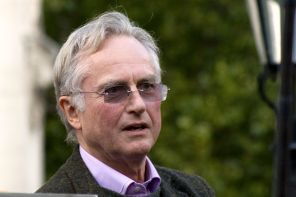Richard Dawkins and Daniel Dennett, half of the “Four Horsemen of New Atheism,” recently indulged an Oxford audience with an hour-long conversation about the “evolution” of religion. The two are among the most outspoken intellectuals currently arguing that religions are more or less evolving things that “trick” adherents into beliefs for their own selfish purposes.
Dawkins, a prominent biologist and author of The God Delusion, coined the word “meme” in 1976 to posit a gene-like unit of culture that can replicate and mutate, and thereby evolve. Daniel Dennett took this theory up in his 2006 book Breaking the Spell, and has long advocated for a post-religious world.
A taping of the event just went up on YouTube, and it is full of armchair speculations, vague references to scientific studies, and good-natured ribbing of religious ignorance. If an hour of vaguely offensive rambling by older men is something you can only handle on Thanksgiving, here are some telling clips:
Here Dennett argues that unified singing and chanting is an evolved trick for keeping religious texts alive. The idea here is that in order to stay alive, religions need to continuously replicate themselves. Where biological species accomplish this through sexual reproduction, cultural species like religions reproduce through chanting and song. What are some other evolutionary tricks, Dawkins asks? Promises of an afterlife!
Dennett also maintains that religions are “designed by natural selection in such a way as to presuppose the relative ignorance of the parts that make it up.” Since more knowledge and reason inevitably equals less faith (something I’ve argued against before), the Internet will bring the end of religion.
Finally, in my favorite clip of the hour, we have the story of two types of historical people: the ignorant masses, who exhibit blind loyalty to the stories of their fathers; and a rare few who question and explore, who in the past became theologians and today become scientists and philosophers. Here Dennett is rehashing that story we tell ourselves generation after generation: the group before us blindly followed the rules, but we are questioning them for the first time!
Christians questioning Jews, Protestants questioning Catholics, Scientists questioning Protestants. We love to call ourselves iconoclasts, but we also know that no human group has unique access to the right questions, and no community stops its own intellectual development once a splinter forms.
Watch the entire video for more of these gems, and weigh in on the conversation! I myself am not convinced by memetics, which usually operates through overt simplification and vague analogies, but these two cover a lot of ground.




